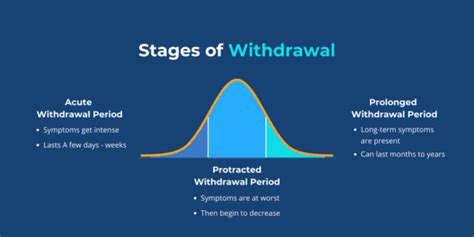Understanding the Symptoms
Caffeine withdrawal headaches are a common, yet often misunderstood, symptom of caffeine dependence. These headaches are typically characterized by a dull, throbbing pain, often located in the temples or the entire head. They can be accompanied by other symptoms like fatigue, irritability, and difficulty concentrating, making them more than just a simple nuisance. Recognizing these symptoms is the first step in managing the withdrawal effectively and safely.
Identifying the specific symptoms, and how they manifest, is crucial to understanding the severity of the withdrawal. Some individuals experience more intense symptoms than others, so it's important to pay close attention to your body's signals.
Recognizing the Pattern
Caffeine withdrawal headaches often follow a predictable pattern. They frequently appear a few hours after your last caffeine intake, especially if you've consumed it regularly. This predictable pattern can help you anticipate and prepare for the discomfort. Tracking your caffeine intake and the timing of your headaches is a valuable tool in managing this condition.
The headaches often start gradually, and worsen over time if left untreated. If you notice a consistent pattern, it can be a significant indicator that you may be experiencing withdrawal symptoms.
The Role of Caffeine Consumption
The intensity and frequency of caffeine withdrawal headaches are directly related to your daily caffeine intake. Heavy daily consumers may experience more severe and prolonged headaches. Understanding your personal caffeine intake is crucial for developing a plan to manage these headaches effectively.
Gradually reducing your caffeine intake over time, rather than abruptly stopping, can significantly lessen the severity and duration of withdrawal symptoms, including headaches. Consulting with a healthcare professional can help determine the best approach for your specific needs.
Differentiating from Other Headaches
While caffeine withdrawal headaches share some characteristics with other types of headaches, such as tension or migraine headaches, there are key differences. Caffeine withdrawal headaches are often accompanied by other symptoms like fatigue and irritability, which distinguish them from other types of headaches.
Understanding the nuances of your personal experience with headaches is key to accurate diagnosis. If you're unsure whether your headache is related to caffeine withdrawal, consulting a healthcare professional can provide a proper diagnosis and personalized treatment plan.
The Importance of Hydration
Staying adequately hydrated is crucial during caffeine withdrawal, as dehydration can exacerbate headache pain. Drinking plenty of water throughout the day can help alleviate some of the discomfort associated with caffeine withdrawal headaches.
Lifestyle Adjustments for Management
Making gradual lifestyle changes is often beneficial in managing caffeine withdrawal headaches. Strategies such as incorporating relaxation techniques, getting sufficient sleep, and maintaining a balanced diet can contribute to overall well-being and reduce the intensity of withdrawal symptoms.
Implementing these changes gradually, rather than making drastic adjustments, is crucial for managing withdrawal headaches and avoiding further complications. Consult a healthcare professional for personalized advice on how to best adjust your lifestyle.
Seeking Professional Guidance
If caffeine withdrawal headaches are severe, persistent, or accompanied by other concerning symptoms, seeking professional medical advice is essential. A healthcare professional can provide a proper diagnosis, recommend appropriate treatment options, and help you develop a personalized plan to manage the withdrawal process safely and effectively.
Don't hesitate to reach out to a doctor or other qualified healthcare provider if you're experiencing significant discomfort or have any concerns about your symptoms. Early intervention can help prevent complications and ensure a smoother transition off caffeine.

